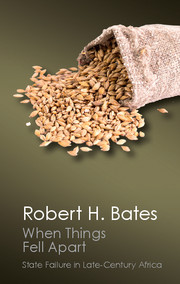6 - Things Fall Apart
from Part Three - Things Fall Apart
Published online by Cambridge University Press: 05 October 2015
Summary
This chapter gathers together the threads of the argument. It highlights the impact of changes in key variables – the level of public revenues and the elite's rate of discount – arguing that sharp, exogenous shocks helped to drive their value into ranges that threatened the underpinnings of political order. That these changes took place in an environment richly endowed by nature meant that the payoffs to the incumbent elites from defection could rapidly become more attractive than those to good governance. In the context of Africa's resource endowments, the value of these variables needed to alter but little before predation became more attractive than stewardship, thus leading to choices that triggered state failure.
The changes in the values of these variables resulted in part from the impact of previous choices: the forging of authoritarian political institutions and the choice of control regimes. It also resulted from sharp external shocks, the first economic recession, resulting from the rise of energy prices, and the second political, resulting from the geo-political realignment that followed the end of the Cold War.
The Decline of Public Revenues
In late-century Africa, governments faced a decline in public revenues, resulting from past policy choices, changes in the global economy, and the predatory behavior of political elites.
The Untaxed Economy
Emizet (1998) notes the web of regulations and controls that Zaire (present-day Congo) imposed upon the producers of primary products. “The goal of these institutional arrangements was to expropriate economic surplus …,” he writes (Emizet 1998, p. 105). But, he notes,
Citizens … reacted to the existing institutional arrangements by exiting the official economy, especially in coffee growing and gold regions of Kivu, Upper Congo (Haut Congo) and Lower Congo (Bas Congo), aswell as in the diamond regions of Eastern Kasai (Kasai Oriental)…. The central bank reported that these activities in the second half of the 1970s cost the government an annual average of 15 percent equivalent in tax revenues. (Emizet 1998, pp. 105–6)
In 1982 Zaire had exported 2,000 kg of gold to Belgium; neighboring Burundi had exported less than 1,000. By 1990, it was Zaire that exported less than 1,000 kg of gold to Belgium and Burundi that exported 2,000. Evidence from the diamond industry also suggests high levels of smuggling, with the amount exported illegally being “50 to 100 percent of recorded exports” (Emizet 1998, p. 122).
- Type
- Chapter
- Information
- When Things Fell ApartState Failure in Late-Century Africa, pp. 97 - 128Publisher: Cambridge University PressPrint publication year: 2015

